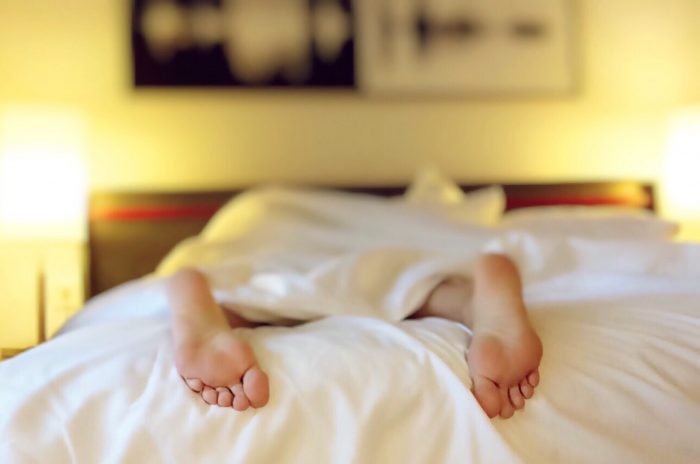
Tips for Good Sleep: It’s not About Counting Sheep
We have all heard how important sleep is to our everyday lives; our health, energy, mood, and patience are all affected by the quality of sleep we get. Not to mention there are various studies linking things like weight and memory to the quality of sleep as well . For these reasons and more, tips for good sleep can be a crucial component to improving the overall health and success of you and your family.
Kids are shown to struggle more during school and in their social lives when they are not receiving appropriate sleep. And while we do what we can to get them in bed on time, it often seems difficult to do much more than that to ensure they are actually sleeping through the night.
To help you out, we have compiled a short list of simple, yet effective tips for good sleep to make sure that you and your family get quality sleep night after night. Don’t worry, we’re not going to suggest that the simple fix is meditation or counting sheep. Ultimately, we know that when utilized, these tips and tricks can improve overall health potentials and keep your crew in their best moods, ready to tackle anything that comes their way.
So here we go, 5 tips for good sleep:
#1: Expose Yourself to Bright Light During the Day

First things first, during the day you need to be soaking up the sun. We all know that exposure to sunlight can benefit our health from the Vitamin D our skin produces in response to it. But what you may not have thought about before, is how natural bright light can affect your body’s circadian rhythm.
Basically, your body keeps an internal clock, that milestones throughout the day help keep on track. Aka: sunrise, noon, and sunset. Your body naturally finds it easier to sleep when it’s dark and awake when it’s light whether you’ve had a full 8 hours or not.
Additionally though, when you are exposed to bright light throughout the day, especially in the morning, your body finds it easier to experience a deeper and more satisfying sleep the next night. And if that’s not enough to convince you, “disrupting this circadian rhythm has also been linked to medical issues like depression, obesity, breast and prostate cancer, and cardiovascular disease.”
If you are like a lot of us and find it difficult to experience a sufficient amount of natural bright light during the day in between work, while taking care of kids, etc. there are other ways to keep your circadian rhythm on track. Certain types of light therapy are able to mimic sunlight by using bright white artificial lights that generate up to 10,000 lux.
#2: Watch Your Late Night Snacks
Our next tip for great sleep has to do with what you are consuming late in the day and into the evening. This may seem obvious, but caffeine is a real negative after mid-day. Although different people react to caffeine differently, it can stay in your blood for up to 6-8 hours and can heighten your awareness and focus, making it difficult to doze off. We hate to say it, but any coffee after 3-4pm should be decaf.
Food can affect sleep as well. People argue that eating late night snacks just prior to bed can actually make it harder to sleep. The type of food you’re eating can also make a difference, but this varies from person to person. Sometimes, high-carb snacks may put a person right to sleep. But in other cases, especially when a person is not used to a high-carb diet, it can make it more difficult.
Finally, stay away from gulping down water right before bed. Although it seems like a healthy habit to end your day with hydration, your body may wake itself up during the night having to run to the loo.
#3: Beware of Negative Light Exposure Before Bed

If you haven’t heard by now, the negative effects of blue light exposure, that’s a whole story in itself. We’re focused on how blue light exposure just before bed can affect your ability to fall asleep, though. The same things that make blue light so beneficial to staying awake during the day, make it terrible for sleeping. Natural and artificial light with blue wavelengths improves attention and mood, increasing alertness. This is not what you want right before bed. Save your entertainment and social media fix for before you get into your bed. Avoid screens and fluorescent/LED lighting as soon as you start winding down.
Other artificial lights can be negative as well. As previously discussed, your body wants darkness when it’s sleeping, because it sends a signal to the brain to decrease levels of melatonin, preparing you to snooze. Because of this, it’s really horrible on your quality of sleep if you keep the lights on. However, even smaller amounts of light such as dim lamps and the glow of your alarm clock can be negative.
#4: Stick to a Schedule
No one wants to hear this tip for good sleep, because it means committing to going to sleep and waking up at the same time each day. While this may feel limiting, it really frees you up to feel like your best self each and every day. Avoid hitting the snooze button, and commit to a single alarm so that you can experience your deepest sleep for as long as possible before the time comes.
Another trick is incorporating a relaxation time into this schedule. If yoga and meditation aren’t your things, there’s plenty of other options. Have a meaningful conversation with your spouse or family to get all your thoughts from the day off your chest BEFORE getting into bed. Sit and listen to some relaxing music. Even one or two songs can make a difference. Whatever it takes to rid your mind of any nagging thoughts, plan to do it every day and before getting ready to sleep.
#5: Optimize Your Sleep Environment

There are dozens of tips for good sleep, but this is our favorite. Your bedroom absolutely needs to be optimized for sleeping. Many people argue that that’s, in fact, the only thing it should be designed for. Avoid your bed until you’re actually going to sleep, and then make sure your surroundings are set up to help you get the rest you deserve. Some of these have been mentioned, but this is the culmination of all the best sleep factors, put into effect in the place where it all happens. Be intentional about the temperature, external lights, amount of noise, and furniture arrangement that are going on in your bedroom.
Choose lamps that aren’t too bright don’t emit blue light. Charge your phone in a place where it won’t light up and wake you in the middle of the night. Drown out excess noise with a calming noisemaker when necessary, and keep your room cool. If you’re struggling with the decor of your room and setting it up as an optimal space for sleep, look to lighting and design experts for help. This is anything but a waste, in the long run, to help you and your family receive great sleep each and every night.
——————————-
So that’s it! Well, of course, there are always additional tips for good sleep, but we truly believe that if you really commit to using these 5 to create healthy habits and a supportive home environment, you will improve you and your family’s overall relationship with sleep.
There are some habits you’ll have to break yourself, to improve your nightly slumber. But if you’re concerned about how the light in your home is affecting the sleep of you or your family, let us at Lit Living, help. Let us help you find the perfect lighting solutions that will increase the health and happiness of your family.
About Us
Based on the Danish concept of hygge and lighting science principles, Lit Living creates lighting systems that noticeably improve safety and wellness in your home by reducing visual strain, enhancing visibility, and improving sensory experiences.
At Lit Living, we utilize different angles, brightness, and colors of lighting throughout the day, imitating the natural light cycles of the sun, to introduce a healthier form of lighting that increases the happiness in your home. Ultimately, this makes your space more welcoming, cozy, and joy-filled for you and your family.
Start Your Healthy Lighting Journey Today!
